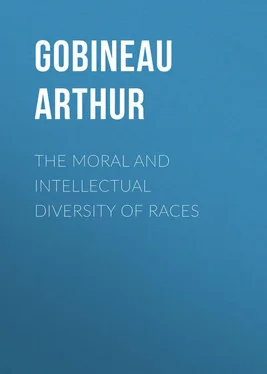Arthur Gobineau - The Moral and Intellectual Diversity of Races
Здесь есть возможность читать онлайн «Arthur Gobineau - The Moral and Intellectual Diversity of Races» — ознакомительный отрывок электронной книги совершенно бесплатно, а после прочтения отрывка купить полную версию. В некоторых случаях можно слушать аудио, скачать через торрент в формате fb2 и присутствует краткое содержание. Жанр: История, foreign_antique, foreign_prose, на английском языке. Описание произведения, (предисловие) а так же отзывы посетителей доступны на портале библиотеки ЛибКат.
- Название:The Moral and Intellectual Diversity of Races
- Автор:
- Жанр:
- Год:неизвестен
- ISBN:нет данных
- Рейтинг книги:4 / 5. Голосов: 1
-
Избранное:Добавить в избранное
- Отзывы:
-
Ваша оценка:
- 80
- 1
- 2
- 3
- 4
- 5
The Moral and Intellectual Diversity of Races: краткое содержание, описание и аннотация
Предлагаем к чтению аннотацию, описание, краткое содержание или предисловие (зависит от того, что написал сам автор книги «The Moral and Intellectual Diversity of Races»). Если вы не нашли необходимую информацию о книге — напишите в комментариях, мы постараемся отыскать её.
The Moral and Intellectual Diversity of Races — читать онлайн ознакомительный отрывок
Ниже представлен текст книги, разбитый по страницам. Система сохранения места последней прочитанной страницы, позволяет с удобством читать онлайн бесплатно книгу «The Moral and Intellectual Diversity of Races», без необходимости каждый раз заново искать на чём Вы остановились. Поставьте закладку, и сможете в любой момент перейти на страницу, на которой закончили чтение.
Интервал:
Закладка:
36
Balzac, Lettre à Madame la Duchesse de Montausier .
That this stricture is not too severe will be obvious to any one who reflects on the principles upon which this legislation was based. Inculcating that war was the great business of life, and to be terrible to one's enemies the only object of manly ambition, the Spartan laws sacrificed the noblest private virtues and domestic affections. They deprived the female character of the charms that most adorn it – modesty, tenderness, and sensibility; they made men brutal, coarse, and cruel. They stunted individual talents; Sparta has produced but few great men, and these, says Macaulay, only became great when they ceased to be Lacedemonians. Much unsound sentimentality has been expended in eulogizing Sparta, from Xenophon down to Mitford, yet the verdict of the unbiassed historian cannot differ very widely from that of Macaulay: "The Spartans purchased for their government a prolongation of its existence by the sacrifice of happiness at home, and dignity abroad. They cringed to the powerful, they trampled on the weak, they massacred their helots, they betrayed their allies, they contrived to be a day too late for the battle of Marathon, they attempted to avoid the battle of Salamis, they suffered the Athenians, to whom they owed their lives and liberties, to be a second time driven from their country by the Persians, that they might finish their own fortifications on the Isthmus; they attempted to take advantage of the distress to which exertions in their cause had reduced their preservers, in order to make them their slaves; they strove to prevent those who had abandoned their walls to defend them, from rebuilding them to defend themselves; they commenced the Peloponnesian war in violation of their engagements with their allies; they gave up to the sword whole cities which had placed themselves under their protection; they bartered for advantages confined to themselves the interests, the freedom, and the lives of those who had served them most faithfully; they took, with equal complacency, and equal infamy, the stripes of Elis and the bribes of Persia; they never showed either resentment or gratitude; they abstained from no injury, and they revenged none. Above all, they looked on a citizen who served them well as their deadliest enemy." — Essays , iii. 389. – H.
37
The horrid scenes of California life, its lynch laws, murders, and list of all possible crimes, are still ringing in our ears, and have not entirely ceased, though their number is lessened, and they are rapidly disappearing before lawful order. Australia offered, and still offers, the same spectacle. Texas, but a few years ago, and all newly settled countries in our day, afford another striking illustration of the author's remark. Young communities ever attract a great number of lawless and desperate men; and this has been the case in all ages. Rome was founded by a band of fugitives from justice, and if her early history be critically examined, it will be found to reveal a state of society, with which the Rome described by the Satirists, and upbraided by the Censors, compares favorably. Any one who will cast a glance into Bishop Potter's Antiquities , can convince himself that the state of morals, in Athens, was no better in her most flourishing periods than at the time of her downfall, if, indeed, as good; notwithstanding the glowing colors in which Isocrates and his followers describe the virtues of her youthful period, and the degeneracy of the age. Who can doubt that public morality has attained a higher standard in England, at the present day when her strength seems to have departed from her, than it had at any previous era in her history. Where are the brutal fox-hunting country squires of former centuries? the good old customs, when hospitality consisted in drinking one's guest underneath the table? What audience could now endure, or what police permit, the plays of Congreve and of Otway? Even Shakspeare has to be pruned by the moral censor, before he can charm our ears. Addison himself, than whom none contributed more to purify the morals of his age, bears unmistakable traces of the coarseness of the time in which he wrote. It will be objected that we are only more prudish, no better at the bottom. But, even supposing that the same vices still exist, is it not a great step in advance, that they dare no longer parade themselves with unblushing impudence? Many who derive their ideas of the Middle Ages, of chivalry, etc., from the accounts of romance writers, have very erroneous notions about the manners of that period. "It so happens," says Byron, "that the good old times when ' l'amour du bon vieux temps, l'amour antique ' flourished, were the most profligate of all possible centuries. Those who have any doubts on the subject may consult St. Palay, particularly vol. ii. p. 69. The vows of chivalry were no better kept than any other vows whatever, and the songs of the troubadour were not more decent, and certainly much less refined, than those of Ovid. The 'cours d'amour, parlements d'amour, ou de courtoisie et de gentilesse,' had much more of love than of courtesy and gentleness. (See Roland on the same subject with St. Palay.)" Preface to Childe Harold. I should not have quoted the authority of a poet on historical matters, were I not convinced, from my own investigations, that his pungent remarks are perfectly correct. As a further confirmation, I may mention that a few years ago, in rummaging over the volumes of a large European library, I casually lit upon a record of judicial proceedings during the fourteenth and fifteenth centuries, in a little commonwealth, whose simplicity of manners, and purity of public morals, especially in that period, has been greatly extolled by historians. There, I found a list of crimes, to which the most corrupt of modern great cities can furnish no parallel. In horror and hellish ingenuity, they can be faintly approached only by the punishment which followed them. Of many, our generation ignores even the name, and, of others, dares not utter them. – H.
38
This assertion may surprise those who, in the words of a piquant writer on Parisian life, "have thought of Paris only under two aspects – one, as the emporium of fashion, fun, and refinement; the abode of good fellows somewhat dissipated, of fascinating ladies somewhat over-kind; of succulent dinners, somewhat indigestible; of pleasures, somewhat illicit; – the other, as the place par excellence , of revolutions, émeutes , and barricades." Yet, all who have pierced below the brilliant surface, and penetrated into the recesses of destitution and crime, have seen the ministering angel of charity on his errand, and can bear witness to the truth of the author's remark. No city can show a greater number of benevolent institutions, none more active and practical private charity, which inquires not after the country or creed of its object. – H.
39
Tottering, falling Greece, gave birth to a Demosthenes, a Phocian; the period of the downfall of the Roman republic was the age of Cicero, Brutus, and Cato. – H.
40
The subjoined picture of the manners of the Frankish conquerors of Gaul, is selected on account of the weighty authority from which it comes, from among a number of even darker ones. "The history of Gregory of Tours shows us on the one hand, a fierce and barbarous nation; and on the other, kings of as bad a character. These princes were bloody, unjust, and cruel, because all the nation was so. If Christianity seemed sometimes to soften them, it was only by the terror which this religion imprints in the guilty; the church supported herself against them by the miracles and prodigies of her saints. The kings were not sacrilegious, because they dreaded the punishments inflicted on sacrilegious people: but this excepted, they committed, either in their passion or cold blood, all manner of crimes and injustice, because in these the avenging hand of the Deity did not appear so visible. The Franks, as I have already observed, bore with bloody kings, because they were fond of blood themselves; they were not affected with the wickedness and extortion of their princes, because this was their own character. There had been a great many laws established, but the kings rendered them all useless by the practice of issuing preceptions , a kind of decrees, after the manner of the rescripts of the Roman emperors. These preceptions were orders to the judges to do, or to tolerate, things contrary to law. They were given for illicit marriages, and even those with consecrated virgins; for transferring successions, and depriving relations of their rights; for putting to death persons who had not been convicted of any crime, and not been heard in their defence, etc." – Montesquieu, Esprit des Lois , b. 31, c. 2. – H.
Читать дальшеИнтервал:
Закладка:
Похожие книги на «The Moral and Intellectual Diversity of Races»
Представляем Вашему вниманию похожие книги на «The Moral and Intellectual Diversity of Races» списком для выбора. Мы отобрали схожую по названию и смыслу литературу в надежде предоставить читателям больше вариантов отыскать новые, интересные, ещё непрочитанные произведения.
Обсуждение, отзывы о книге «The Moral and Intellectual Diversity of Races» и просто собственные мнения читателей. Оставьте ваши комментарии, напишите, что Вы думаете о произведении, его смысле или главных героях. Укажите что конкретно понравилось, а что нет, и почему Вы так считаете.












